University of New Hampshire: Social Work + Adventure = Effective Therapy
Nicholas Magle-Haberek has always been an outdoors guy. After getting his bachelor’s in outdoor education and working for a wilderness therapy program in Utah, he decided in 2008 to pursue a master’s in outdoor education at the University of New Hampshire (UNH). Toward the end of his first semester, the UNH College of Health and Human Services’ Outdoor Education and Social Work departments got approval to offer a dual master’s degree.
“It was like the lightbulb went on,” says Magle-Haberek, MS, MSW, LCSW, who is now clinical director at BaMidbar Wilderness Therapy, based in Denver. “My background had always been focused on the outdoor part of it, but I realized that the thing I’ve really loved about this work of taking people into the outdoors is the personal growth they get out of it.”
So why not double down by getting the social work degree as well?
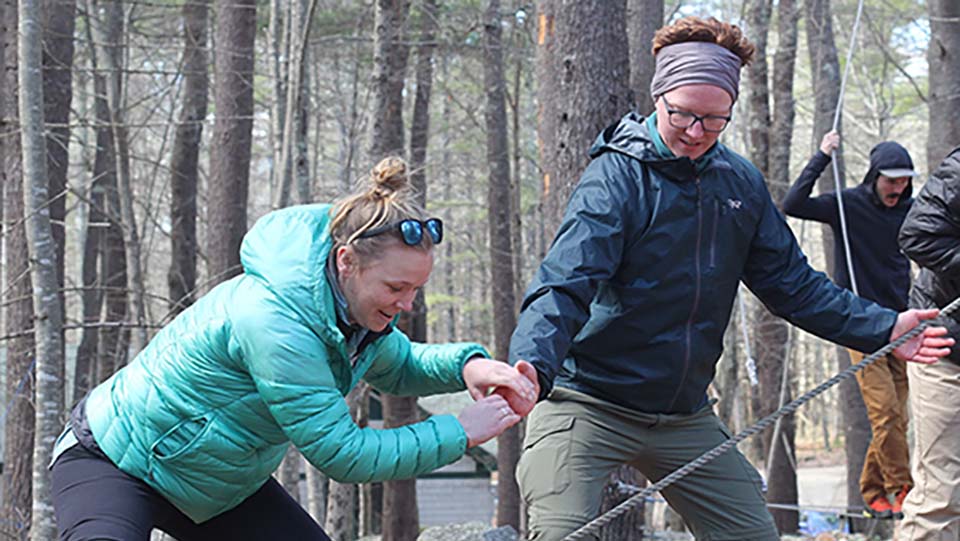
Recent dual-graduate Mackenzie Keefe (left) and current MSW student Shea Gorman on the program's ropes challenge course this past spring
All-in for the Dual Master’s
UNH’s dual master’s degree in social work and kinesiology: outdoor education is not for people who are still “finding themselves.” Applicants need to have at least two years’ experience in wilderness therapy or some other type of adventure program. And because of the cost and the two and a half years of intense, highly specialized study, they need to be completely committed and really know what they’re getting into, says social work professor Dr. Anita R. Tucker, co-coordinator and co-founder of the dual-degree program, still the only one like it in the country.
“You may love to hike. But the minute you bring eight dysregulated adolescents on a hike without an intentional plan or the ability to implement it, you may never want to hike again,” Tucker says.
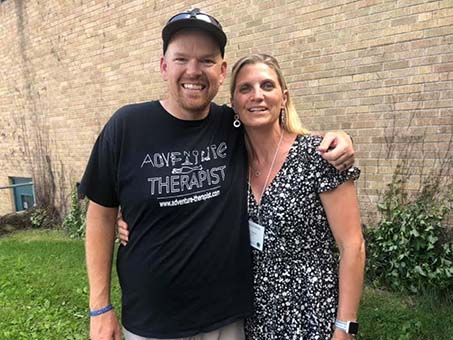
Dr. Anita Tucker with the first dual-degree graduate, Nicholas Magle-Haberek, who is teaching Historical Foundations of Outdoor Experiential Education for his old program this year
Students have course and other requirements from both departments, one of the most important being a research seminar where they produce a peer-reviewed paper, as opposed to a thesis. It’s basically a living document — sometimes drawing on information from a large adventure therapy database launched by kinesiology professor Dr. Michael Gass, the dual-degree program’s other co-coordinator and co-founder — that students are encouraged to build on after graduation to help further improve the field.
Recent grad Mackenzie Keefe, MS, MSW, now an adventure-based counselor with Adventure Lore in Danville, N.H., says she is still adding to her research work regarding support for young adults transitioning from residential care to more independent living who have been through wilderness therapy. (That was also the focus of her internship at Onward Transitions in Portland, Maine.)
Marriage of Two Disciplines
“Adventure therapy,” says Gass, “is the prescriptive use of adventure experiences provided by mental health professionals, often conducted in natural settings that kinesthetically engage clients on cognitive, affective and behavioral levels.”
It occurs through adventure experiences that can take place either outdoors or indoors. The important thing is the experience and the client’s reaction to it. Adds Tucker, “Instead of talking about something, people’s issues or problems or strengths show themselves in the moment through the engagement activity.”
And the therapist is there to draw the client’s attention to them and help that person consider them right on the spot.
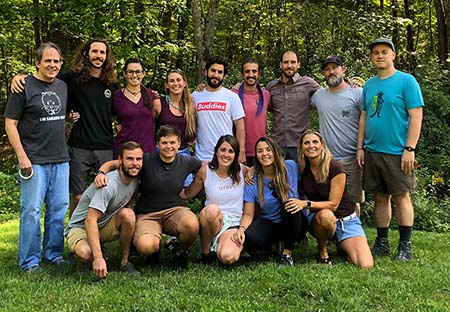
At the annual dual-degree retreat in fall 2018: organizers Dr. Anita Tucker (front row, far right) and Dr. Michael Gass (back row, far left) with new and returning dual-degree students.
One time, Magle-Haberek was on a backpacking trip in Rocky Mountain National Park with a group that included a young client who was having some struggles in her life, one of which was her relationship with her parents, which left her reluctant to ask them for help. Meanwhile, during the hike, she was struggling with a big, heavy backpack and ultimately asked Magle-Haberek, who had a much lighter pack, if he could carry some of her load.
So the metaphorical link between the experience and day-to-day life, which Magle-Haberek pointed out to her, was the tough, burdensome uphill climb she was on that got a lot easier when she asked for some help.
“It really kind of shifted some of her momentum in the program,” he says, “and she became a little more communicative with her parents.”
Other Paths to Adventure
Only 40 social work practitioners have this dual degree so far, but what if someone who has a regular MSW wants to get involved in adventure therapy? There are some options.
One is the two-year-old, interdisciplinary Certified Clinical Adventure Therapist (CCAT) certificate from the Association for Experiential Education (AEE) for those with a master’s or doctorate in clinical practice. “It’s basically a road map for what kind of training is important, what kind of experience is important,” says Magle-Haberek. “And it owes a lot to the dual-degree program at UNH.”
Training can be found at regular AEE conferences as well as through organizations like Life Adventures for All, RelateAbility, PLLC, and Magle-Haberek’s latest pursuit, Adventure Therapist LLC.
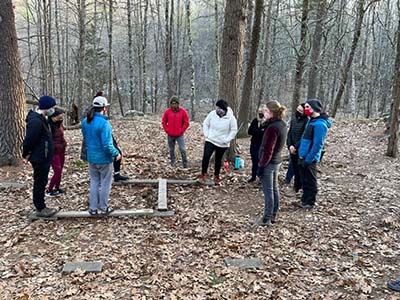
Outdoor “experience”: In a challenge called “The Muse,” students work together to get their entire group across a large space by walking only on three movable boards.
“It’s about using limited resources to move forward, which I think most people can relate to,” says recent program grad Mackenzie Keefe.
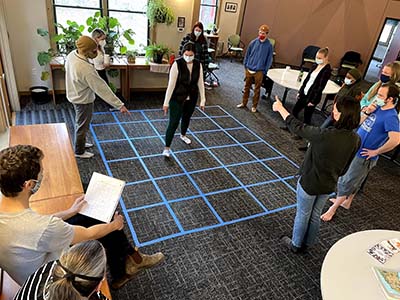
Indoor experience: In "Pathways," students help one another navigate predetermined routes across the blue grid, communicating only through body language